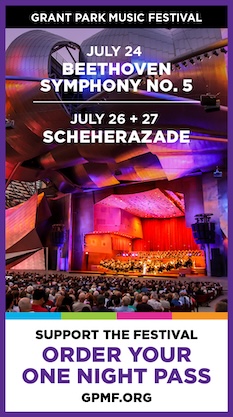Grant Park leads off final week with Bolcom’s “Cabaret Songs”

In addition to presenting the most varied and intriguing orchestral programs in Chicago, the Grant Park Music Festival went a step beyond its regular advocacy of American music by appointing William Bolcom composer in residence this summer.
Bolcom’s music is thus featured in this final week of the summer lakefront festival. The weekend program will bring the world premiere of his Millennium: A Concerto-Fantasia for Orchestra. First up Wednesday night at the Pritzker Pavilion was Bolcom’s Cabaret Songs, performed by young artists of the Lyric Opera’s Ryan Opera Center who joined Carlos Kalmar and the Grant Park Orchestra.
The Cabaret Songs are among the composer’s most popular and characteristic works. The lyrics—by Bolcom’s late, longtime collaborator Arnold Weinstein—tell of life’s heartaches and the darker side of love with tales centered on societal misfits and outcasts, but always with a wry humor and affection. Likewise, Bolcom’s music is crafted in an idiom that so fluently melds art song with elements of American musical vernacular—ragtime, jazz, and popular song—that questions of genre simply become irrelevant. (Two of the Cabaret Songs, “Fur” and “Places to Live” were being heard in new Bolcom orchestrations written for this performance.)
Even with the necessary amplification, the four singers from the Ryan Opera Center did an impressive job Wednesday night tackling Bolcom’s settings. These songs are deceptively difficult, easy technically yet often challenging for young artists to toss off with the necessary personality and stage charisma, which, often, are still unformed. Bolcom provided his own engaging spoken introduction.
Will Liverman began the set in superb style, deploying his robust baritone in “Surprise,” “The Actor” and, best of all, a very freely phrased and effective “Song of Black Max.”
J’nai Bridges’ smoky mezzo was well-suited to “Toothbrush Time” depicting the regretfully ironic next morning of a one-night stand. She also nicely conveyed the surreal encounter of “The Total Stranger in the Garden” and the dreamy wish for other places and better things in “Places to Live.”
Crisper enunciation and a sassier delivery from Julie Anne Miller would have made for a more comically effective “Amor.” Yet the statuesque mezzo tossed off the tongue-twisting–and rather disgusting–gustatory catalogue of “Lime Jello Marshmallow Cottage Cheese Surprise” in fine style and brought out the sardonic humor of “At the Last Lousy Moments of Love” (one of the best song titles ever).
Anthony Clark Evans was amusing in the jaunty rhythms of “Fur” and had a field day with “George,” Weinstein’s affectionate tribute to a doomed yet lovable opera-loving transvestite, the baritone even camping it up a bit at the coda. Kalmar led alert, fitfully boisterous accompaniments, with fine playing by the orchestra.
Music of Mozart and Walter Piston framed the evening.
The program led off with a superb account of Mozart’s Symphony No. 25. Kalmar is a fine Mozartean and directed a lean, idiomatic performance. The driving minor-key drama of the opening Allegro was a fine foil for the elegant, flowing Andante. Kalmar also ensured deft dynamic marking in the Minuet–with notably rustic winds in the trio– and a finale that neatly blended airy grace and firm momentum.
Walter Piston is one of the many gifted American symphonists of the mid-20th century whose works remain inexplicably neglected. Far from dry and academic as some of his detractors would have it, the best of Piston’s music is melodic, smartly orchestrated and eminently accessible.
The suite from his ballet, The Incredible Flutist, remains Piston’s most-performed work and Wednesday night Kalmar and the Grant Park Orchestra offered strong advocacy for a broader revival of Piston’s music in this exhuberant performance of high-stepping panache.
Kalmar brought out the atmospheric impressionism of the Introduction as surely as the sashaying brilliance of the “Spanish Dance” and resounding “Polka” finale. Piston’s lilting melody for the “Tango of the Merchant’s Daughter” is not remotely a tango but still offers one of the great tunes in all American music, here drawn out with great warmth and richness by Kalmar and the Grant Park strings. Mary Stolper brought just the right sense of pensive nocturnal mystery to her central flute solo.
The orchestra was fully into the spirit of Piston’s score with its opportunities for extramusical participation, whooping it up as a group of vociferous revelers as the circus arrives in town. Instead of the single dog bark at the end of the “Circus March” called for by Piston, Kalmar enhanced the effect with a chorus of canine contributions from the orchestra.
Carlos Kalmar and the Grant Park Orchestra will present the world premiere of William Bolcom’s Millennium 6:30 p.m. Friday and 7:30 p.m. Saturday. The final program of the Grant Park Music Festival season will also include John Adams’ Tromba Lontana and Ravel’s complete Daphnis et Chloe. gpmf.com
Posted in Uncategorized

